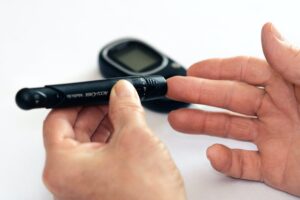Some beta blockers may raise or lower glucose—here’s what to know
When you’re taking medication for high blood pressure, blood sugar might be the last thing on your mind. But certain drugs, especially beta blockers, can sometimes interfere with how your body regulates glucose. That doesn’t mean you should stop taking them—but it does mean awareness matters, especially if you have diabetes or are at risk.
Understanding how your blood pressure meds interact with blood sugar is an important step in staying on top of your overall health. Here’s what the latest evidence says and how to stay safe.
What Are Beta Blockers?
Beta blockers are a type of medication commonly used to treat high blood pressure, irregular heart rhythms, heart failure, and even anxiety. They work by blocking the effects of adrenaline, which slows the heart rate and reduces blood pressure.
Some commonly prescribed beta blockers include:
- Atenolol (Tenormin)
- Metoprolol (Lopressor, Toprol-XL)
- Propranolol (Inderal)
- Carvedilol (Coreg)
While they’re effective at managing heart-related conditions, some types of beta blockers can also have unintended effects on other systems in the body—including blood sugar control.
How Blood Pressure Meds Can Impact Blood Sugar
Not all beta blockers have the same effect on blood sugar, but research shows that non-selective beta blockers—which block both beta-1 and beta-2 receptors—may blunt some of the body’s natural responses to low blood sugar (hypoglycemia). This can be especially problematic for people with diabetes who rely on symptoms like shaking or rapid heartbeat to know when their blood sugar drops.
On the flip side, beta blockers may also slightly raise blood glucose in some people by interfering with insulin release or glucose metabolism. That said, the changes are usually modest, and the benefits of blood pressure control generally outweigh these risks.
Key takeaways:
- Non-selective beta blockers (like propranolol) may pose a higher risk for blood sugar changes
- Cardioselective beta blockers (like metoprolol) tend to have a lower impact
- Effects vary by individual and dosage
Who Should Be Most Cautious?
If you’re living with diabetes, prediabetes, or insulin resistance, it’s especially important to know how your blood pressure meds may affect your glucose control. That’s also true if you’re taking other medications that lower blood sugar, such as insulin or sulfonylureas.
You may be at greater risk of hypoglycemia unawareness if:
- You have type 1 or type 2 diabetes
- You take insulin or other medications that can lower glucose
- You’re on a non-selective beta blocker
- You’ve had episodes of low blood sugar in the past
If this sounds like you, it doesn’t mean you can’t take beta blockers—but it does mean your healthcare provider may want to monitor things more closely or adjust your medication plan.
Smart Steps for Staying Safe
The good news? With the right precautions, most people can take beta blockers without major issues. Here’s how to stay proactive:
- Monitor your blood sugar regularly, especially after starting or changing medications
- Keep track of symptoms like dizziness, shakiness, confusion, or unusual fatigue
- Talk to your doctor about your full medication list—some blood pressure drugs may be better fits if you’re managing diabetes
- Don’t stop medications suddenly without medical advice—doing so can lead to serious complications
Ultimately, the goal is to manage both blood pressure and blood sugar effectively. With your doctor’s guidance, that’s absolutely possible.
If you’re on a beta blocker and also watching your glucose levels, bring it up at your next appointment. A quick conversation could help you avoid unexpected dips—or spikes—in your blood sugar.
Top Weight Loss Programs

Remedy Meds

Medvi

Hims

ShedRX









